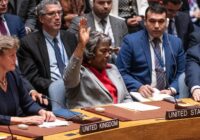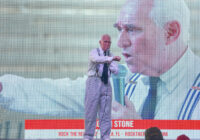Anti-refugee statements by American governors are stoking a climate of fear and resentment.
Statements by 28 US governors that their states will not welcome Syrian refugees—or in some cases only those who are Muslim—are indefensible. Many analysts have noted that governors have no legal authority to deny entry to refugees, but their statements nevertheless suggest a reprehensible willingness to make refugees’ lives even more difficult. Moreover, use of a leadership position to promote suspicion of refugees perpetuates a culture of selective compassion, encouraging hate crimes and discrimination.
It is highly unlikely a Syrian refugee played a role in the recent Paris attacks. Syrian refugees are, after all, fleeing the very type of violence perpetrated in Paris and are hated and targeted by Daesh (Islamic State). The attacker near whose body a Syrian passport was found is not known to have received approval for refugee status from any country, and it’s possible the passport was a forgery, and/or possibly intended to provoke retaliation against refugees. Yet even were a Syrian refugee to have played some role in an attack somewhere in the world, there would be no basis to impose collective responsibility.
Attempts to hold national, racial or religious groups accountable for individuals’ commission of violence are unfair and dehumanizing. Not only must Syrians flee for their lives, but they are now being conflated with those who seek to kill them.
Blocking Refugees
“Neither you nor any federal official can guarantee that Syrian refugees will not be part of any terroristic activity,” Texas Governor Greg Abbott wrote in an open letter to President Barack Obama. He was correct on that point, as no human is omnipotent or omniscient. But similarly, neither Governor Abbott nor any of us can guarantee that any given person will never commit violence. Human actions, including violence, are the product of choices, not predestination.
Assumptions that one’s national origin or religion make them more likely to commit violence are supported only by bigotry—which is to say, not at all. The best way to protect against political violence is to investigate all violence when it occurs and focus on actual leaked plans and threats, not to discriminate against broad swaths of our global community.
As many have pointed out, states do not have authority to refuse to accept refugees; refugee resettlement determinations are made at the federal level. And the screening process for refugees is exceedingly rigorous. Many have also noted that the federal government seeks to consult with states in making resettlement decisions, so governors can opt to be more or less cooperative. But the US Constitution forbids states from discriminating on the basis of nationality or religion; states cannot selectively refuse cooperation based on these factors. And ultimately, resettlement decisions remain in federal hands.
Though they cannot outright deny resettlement, governors’ anti-refugee statements stoke a climate of fear and resentment toward victims of the very sort of violence perpetrated in Paris, except in that in Syria—and many other countries where fleeing refugees may feel the effects of this backlash—violence has been even more unrelenting.
These statements are out of touch with our better values as a nation. Many Syrian refugees already have families inside the United States. Denying them family reunification would provoke additional pain and would conflict with our priority as a nation to promote family unification.
Calls for closing the doors in the faces of refugees represent a favor to Daesh. The message about the value the US places on religious freedom, moreover, that would be sent by selectively denying Muslim refugees while admitting Christians—as, for example, Governor Jeb Bush advocated—is one that Daesh would be especially thrilled to hear. Are our values so weak that we relinquish them when manipulated?
Moreover, if our nation seeks to advance conflict resolution, we need to learn from those who understand the war best. In Syria as everywhere, a country’s nationals hold an expertise we cannot obtain through even the most committed press coverage. By welcoming refugees to their new homes, we allow them to inform our understanding of what is taking place in conflict regions. The United States has an obligation toward the world to understand fully what is happening in Syria in order to pursue informed actions that promote a just peace. Refugees’ expertise provide an essential piece of that understanding.
An International Obligation
Our international community, through the United Nations (UN), defined what it means to be a refugee under international law through the UN Refugee Convention of 1956 and its 1967 Protocol, and established clear international obligations toward those whose states cannot or will not protect them from persecution. In 1980, the United States incorporated the international refugee definition into our domestic law.
The convention provisions were not perfect. In fact, they left out many in need of protection, even more so before the 1967 Protocol. But the UN’s reasons for drafting the convention—in particular for setting out objective factors by which to determine who is a refugee—are worth remembering.
The convention authors did not draft the document so its obligations could be disregarded when politically expedient. Nor did they draft it so its contents could be applied selectively to accommodate demagoguery or knee-jerk fear-based responses.
The authors took this momentous step in the wake of nations having failed millions of refugee souls during the two World Wars. They sought to protect us—our current world—from the panic and bigotry so frequently displayed in the face of refugee crises. The convention drafters understood that a basic component of being human involves empathy and that we have the capacity to offer sanctuary rather than abandon our fellow human beings to be persecuted and killed. But they had also witnessed human capacity for enormous evil, including evil by omission.
Without clear guidance, the convention authors knew we would repeat our failures of responsibility toward stateless people. They sought to shield the better parts of human nature from destructive instincts, so they provided a map to chart the confusing, and too-often politically exploited, environments that surround international conflict and mass migration.
Similarly, we must now shield a part of our humanity, our Syrian refugee brothers and sisters, from that which they are fleeing.
The views expressed in this article are the author’s own and do not necessarily reflect Fair Observer’s editorial policy.
Photo Credit: Ververidis Vasilis / Shutterstock.com
 We bring you perspectives from around the world. Help us to inform and educate. Your donation is tax-deductible. Join over 400 people to become a donor or you could choose to be a sponsor.
We bring you perspectives from around the world. Help us to inform and educate. Your donation is tax-deductible. Join over 400 people to become a donor or you could choose to be a sponsor.
Support Fair Observer
We rely on your support for our independence, diversity and quality.
For more than 10 years, Fair Observer has been free, fair and independent. No billionaire owns us, no advertisers control us. We are a reader-supported nonprofit. Unlike many other publications, we keep our content free for readers regardless of where they live or whether they can afford to pay. We have no paywalls and no ads.
In the post-truth era of fake news, echo chambers and filter bubbles, we publish a plurality of perspectives from around the world. Anyone can publish with us, but everyone goes through a rigorous editorial process. So, you get fact-checked, well-reasoned content instead of noise.
We publish 2,500+ voices from 90+ countries. We also conduct education and training programs
on subjects ranging from digital media and journalism to writing and critical thinking. This
doesn’t come cheap. Servers, editors, trainers and web developers cost
money.
Please consider supporting us on a regular basis as a recurring donor or a
sustaining member.
Will you support FO’s journalism?
We rely on your support for our independence, diversity and quality.






